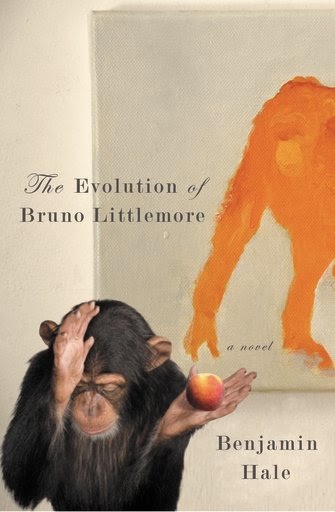
There's also great pleasure in the audacity of the story itself. There is a Bellovian exhuberance befitting a Chicago-born autodidact. Much of the pleasure comes from the book's voice. So let's get this out of the way: THE EVOLUTION OF BRUNO LITTLEMORE is an absolute pleasure. It's like being a baseball scout in Oklahoma in the late 1940s and seeing this young kid running around centerfield, and you ask the guy next to you, 'Who's that?' And the guy says, 'I don't know, some kid named Mickey Mantle.'"-Jonathan Ames, author of Wake Up, Sir!, The Extra Man and the current HBO series Bored to Death, Hale's novel is so stuffed with allusions high and low, so rich with philosophical interest, that a reviewer risks making it sound ponderous or unwelcoming.

He's got a lot to tell us, and we've got a lot to learn."- Ron Charles, Washington Post, "The most talented and intriguing young writer I've met in years. But just when you want to stuff this chimp back in his cage, he comes up with some unforgettable new adventure, like his off-off-Broadway production of "The Tempest" that's absolutely transporting.

No trip to the zoo, western Africa or even the mirror will ever be the same. When the novel's antics aren't making you giggle, its pathos is making you cry, and its existential predicament is always making you think. "The Evolution of Bruno Littlemore" is a brilliant, unruly brute of a book - the kind of thing Richard Powers might write while pumped up on laughing gas. Benjamin Hale's audacious first novel, "The Evolution of Bruno Littlemore," is a tragicomedy that makes you want to jump up on the furniture and beat your chest.

(When the pair do consummate, he probes her in disbelief, as "Caravaggio's Thomas the Doubter does to the wound of the resurrected Christ.") The lyrical flourishes can become theatrical, and, toward the end, the narrative gets baggy, but Hale's relish for his subject, and his subject's relish for language, never flags.", "We've finally got a book to screech and howl about. He also becomes a lover-but the story doesn't stray into bestiality.

Along the way, Bruno becomes an experimental test subject, an Expressionist painter, a Shakespearean actor, and a murderer. His hyperallusive, Nabokovian confession, dictated to an amanuensis, is the tale of "a first-generation immigrant to the human species," encompassing Milton, Whitman, Darwin, Diogenes, and Kafka. "Hale's exuberant d but is the bildungsroman of Bruno, a chimp born in a zoo who forsakes his animalhood and ends up, hairless and human-nosed, imprisoned for a crime of passion.


 0 kommentar(er)
0 kommentar(er)
